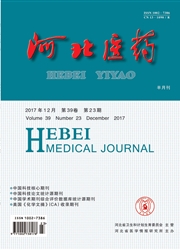

 中文摘要:
中文摘要:
目的全反式维甲酸(All Trans-Retinoic acid,ATRA)处理肝癌细胞系HepG2细胞后进行表达谱基因芯片技术分析,探索其对肝癌细胞基因表达谱的影响。方法 80μmol/L的全反式维甲酸处理HepG2细胞24 h后,提取细胞的mRNA,应用基因表达谱芯片技术对差异表达的mRNA进行检测和分析,以等体积无水乙醇处理作为对照组。结果全反式维甲酸处理HepG2细胞后,共筛选出661个差异表达基因,这些差异基因与肿瘤细胞的信号转导、增殖分化等都有密切的关系。结论成功的应用表达谱芯片技术筛选出ATRA处理细胞后的差异表达基因,为进一步探讨ATRA对肝癌细胞的作用机制奠定了基础,也为临床应用ATRA诱导肝癌分化提供理论依据。
 英文摘要:
英文摘要:
Objective To carry out expression profile microarray analysis after hepatoma carcinoma cell line-HepG2 cell are treated by all-trans retinoic acid( ATRA) in order to explore its effects on gene expression profile of hepatoma carcinoma cells. Methods The HepG2 cells were treated by 80μM ATRA( trial group) and equal volume of ethanol( control group) for 24 h,then the total mRNA was extracted from the treated cells. The cDNA microarray technique was used to detect and compare the differentially expressed genes between the two groups. Results After HepG2 cells were treated by ATRA,a total 661 differentially expressed genes were screened out,moreover these genes were closely correlated to cell signal transduction,cell proliferation and cell differentiation. Conclusion The c DNA microarray technique is used to screen successfully the differentially expressed genes after HepG2 cells are treated by ATRA,which establishes the foundation for exploring further the action mechanism of ATRA on hepatocellular carcinoma,and provides also an important theoretical basis for the clinical application of ATRA to induce differentiation of liver cancer cells.
 同期刊论文项目
同期刊论文项目
 同项目期刊论文
同项目期刊论文
 期刊信息
期刊信息
